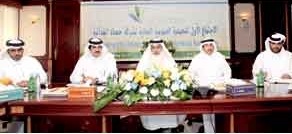
Al-Hajri (centre) and board members at Hassad Food’s first ordinary general assembly meeting yesterday
Gulf Times | 1 June 2010
By Bonnie James
Deputy News Editor Hassad Food Company intends to invest $500mn to $700mn this year for projects across the world as part of its mission to ensure food security for Qatar, chairman and managing director Nasser bin Mohamed Mubarak al-Fuhaid al-Hajri has said. “Our five pillars are production and supply of rice, sugar, grain, meat (white and red), and animal feed,” he explained after the company’s first ordinary general assembly meeting yesterday. The countries and sectors identified in 2009 are Qatar (animal feed, flower, poultry, logistic, green house); Australia (sheep, grain); Brazil (poultry/beef, sugar, grain); Argentina (grain); Sudan (sugar, grain, animal feed); Turkey (meat, dairy, sheep grain); Cambodia, India, Pakistan (rice); Uruguay (rice, grain, meat) and Georgia (grain). “Hassad Food, established in July 2008, has launched two good projects, in Qatar and Australia, respectively,” al-Hajri explained. Hassad Qatar animal fodder, launched commercially in Qatar in 2009, is being expanded substantially this year and would see multi-fold rise in sales and profitability. Hassad has also commenced operations in Australia by forming a 100% subsidiary company, acquisition of the first farm land and introduction of Awassi lamb breeding programme. “Similarly, we have established 100% subsidiaries in Sudan and Turkey to facilitate targeted investment, and 2010 will be the year of execution of the strategic investment plan,” the official said. In Qatar, Hassad Food will be establishing a QR300mn poultry farm, which is to begin production two-and-a-half years from now. The QR40mn cut flower production project is expected to commence in Qatar by January 2011. “All the local investments in Qatar will be done by our subsidiary Hassad Qatar, which has already spent QR35mn for the animal feed project,” al-Hajri said. Asked about the agriculture plans in Qatar, Hassad Qatar chairman and managing director explained that crops are to be grown in green houses. “We could be using aeroponics or hydroponics in the green houses,” he maintained. Aeroponics is the process of growing plants in an air or mist environment without the use of soil or an aggregate medium whereas hydroponics is a method of growing plants using mineral nutrient solutions, in water, without soil. “We are also evaluating organic farming as an option,” al-Hajari said while observing that green houses are almost organic as they use very little pesticides. To a question on why the company is not investing in the neighbouring Arab countries, the official said Hassad is looking at large scale projects which could only be implemented in Australia or Latin America.










